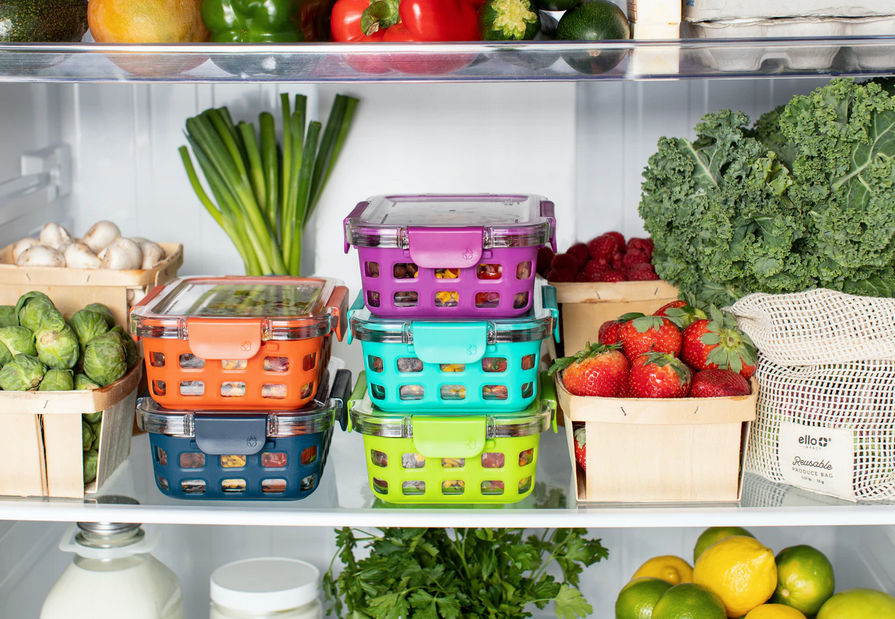
Freezing food allows you to vastly prolong its shelf life. However, freezing food incorrectly can ruin it and even be dangerous, as it can allow bacteria to build up. The following tables provide guidelines on how to freeze both raw and cooked foods so that they will taste great and won’t make you (or anyone else) sick.
Freezing and Thawing Raw Foods
|
Food
|
Freezing Guidelines
|
Thawing Guidelines
|
||
|
Butter
|
Freeze butter in its original carton or in a tightly sealed plastic freezer bag. It will keep for 8–12 months.
|
Thaw in the refrigerator or at room temperature.
|
||
|
Milk and cream
|
Freeze milk and cream in their original cartons. They’ll keep for one month. Leave one inch of space at the top of the carton—milk expands when frozen.
|
Thaw in the refrigerator.
|
||
|
Cheese
|
Hard and semihard cheeses such as cheddar, Parmesan, Swiss, and Monterey Jack keep in the freezer for 2–3 months if wrapped tightly in two layers of freezer wrap (a thicker kind of plastic wrap). Don’t freeze soft cheeses such as brie, goat cheese, camembert, or blue cheese.
|
Thaw in the refrigerator.
|
||
|
Chicken
|
A whole chicken stored in a sealed plastic freezer bag will keep in the freezer for 12 months. Chicken parts will keep for nine months.
|
Thaw in the refrigerator on a plate to catch dripping juices. You can also thaw in the microwave (on “defrost”), but cook promptly after thawing.
|
||
|
Beef (including ground beef)
|
Frozen ground beef wrapped tightly in two layers of freezer wrap will keep for up to three months. Cuts of beef—tightly wrapped—will keep for six months.
|
Follow the thawing guidelines for chicken.
|
||
|
Fish
|
Cleaned fish (fillets, steaks, or shrimp) wrapped tightly in two layers of freezer wrap will keep for 2–3 months. Freezing shellfish isn’t recommended.
|
Thaw in the refrigerator on a pan or plate to catch dripping juices. Don’t thaw in the microwave.
|
||
|
Fruit
|
Whole berries and grapes hold up well and will keep in tightly sealed freezer bags for up to six months. Apples, pears, peaches, and pineapples freeze best after being sliced, sprinkled with sugar and lemon juice, and packed tightly in plastic freezer bags. They will also keep for six months.
|
Thaw in the refrigerator.
|
Many vegetables can also be frozen, but they must be blanched (partially cooked) first in boiling water for 1–10 minutes, depending on the density of the vegetable. If you’re planning meals primarily to save time, freezing vegetables is not recommended. Purchasing and using fresh vegetables right away is almost always a more effective use of time than blanching, drying, freezing, and thawing.
Freezing and Thawing Cooked Foods
|
Food
|
Freezing
|
Thawing
|
||
|
Breads
|
Bread made from yeast can be frozen in its original wrapper or bag for 6–8 months. Quick breads (those made with baking powder or soda, like biscuits, muffins, corn bread, and banana bread) will keep for 2–4 months.
|
Thaw breads at room temperature, in the microwave, or in an oven no hotter than 300°F.
|
||
|
Soups and stews
|
Soups and stews stored in tightly sealed plastic containers will keep for six months in the freezer. To maximize freezer space, consider omitting a portion of the soup’s liquid content when first cooking it and then placing a label on the container that indicates how much liquid you left out. Add the liquid back in when you reheat the soup.
|
Soups and stews can be thawed in the refrigerator, in the microwave (on “defrost”), or on the stovetop. If the soup or stew contains meat, reheat it gently so as not to dry out the meat.
|
||
|
Cooked pasta
|
Pasta will keep for 6–8 months in the freezer if it’s stored in tightly sealed freezer bags. If you initially cook the pasta al dente (so that it has just an edge of hardness), it’s less likely to become overcooked and mushy when you thaw and reheat it.
|
Thaw pasta in the refrigerator, in the microwave (on “defrost”), or in gently simmering water.
|
||
|
Mashed potatoes
|
Freeze mashed potatoes stored in tightly sealed plastic containers. They will keep for 2–3 months.
|
Thaw mashed potatoes in the refrigerator or microwave (on “defrost”). After thawing, add some milk, cream, or butter to prevent them from drying out during reheating.
|
||
|
Cooked ground beef
|
Freeze ground beef in tightly sealed plastic containers. It will keep for 2–3 months.
|
Thaw in the refrigerator, microwave (on “defrost”), or, if you’re making spaghetti with meat sauce, simmer in tomato sauce.
|
||
|
Larger cuts of meat or poultry
|
Cooked steaks, chops, and chicken breasts, legs, or thighs will keep for 4–6 months in the freezer if covered tightly in plastic wrap.
|
Thaw in the refrigerator or microwave (on “defrost”). These cuts are prone to drying out when reheated. Consider serving cool by cutting into pieces and adding to salads.
|
Foods That Should Not Be Frozen
Certain foods do not hold up well in the freezer and should never be frozen. These include:
- Celery
- Cottage cheese
- Cucumbers
- Eggs
- Lettuce
- Mayonnaise
- Boiled potatoes
- Radishes
- Scallions
- Soft cheeses (brie, goat cheese, blue cheese, etc.)
- Sour cream
- Tomatoes
- Yogurt

